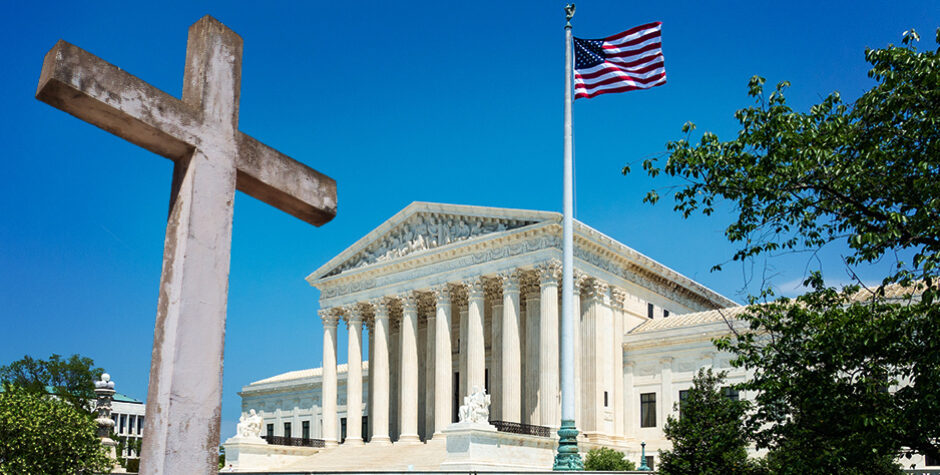The United States Supreme Court Blocks States From Imposing Discriminatory COVID-19 Restrictions on Churches
The Supreme Court last week made a major move in upholding America’s constitutional norms, including the importance of the First Amendment’s protection of the free exercise of religion. Last week, the Court blocked enforcement of Governor Cuomo’s hyper-restrictive and highly discriminatory rules for in-person religious services in New York until the government provides logical justification for treating worship more harshly than comparable or riskier activities. In addition, this case makes clear the importance of Supreme Court nominations and confirmations because the Court’s newest member, Justice Amy Coney Barrett, cast the deciding vote.
In Roman Catholic Diocese of Brooklyn, New York v. Andrew M. Cuomo, Governor of New York, the Court prevented the governor from enforcing Executive Order 202.68, which placed a 10-25 person occupancy limit on churches and synagogues located in certain zones designated by color. In designated red zones, no more than 10 people could gather; and in orange zones, no more than 25 could attend. The evidence available implies that the governor targeted certain houses of worship by creatively gerrymandering the designated zones to ensure the enclosure of houses of worship within the most restrictive zones. This means that both the diocese and the Orthodox synagogue faced more restrictive rules than similarly situated secular facilities even though the uncontradicted evidence showed that the religious facilities had already complied with all precautionary measures and had operated at 25% or 33% of capacity for months without a single outbreak.
Among other things, the governor’s restrictions are outrageously discriminatory on their face because in red zones, while a church could not admit more than 10 persons, businesses deemed essential such as acupuncture facilities, campgrounds, and garages could operate without restrictions. Discrimination was even more egregious in orange zones. Taken as a whole, the following situation unfolds: while large stores could operate with hundreds or thousands of people shopping per day, churches were limited to admitting either 10 or 25 irrespective of capacity. This means that St. Peter’s Church with a capacity of 2,500 was limited to a 10-person limit, while other entities were free to operate without restrictions.
As Professors McConnell and Raskin observe, one reads the briefs of the case in vain for an understandable explanation for the difference in treatment. In reality, there is no explanation of disparate treatment that can pass the smell test.
As the Supreme Court correctly noted: “[E]ven in a pandemic, the Constitution cannot be put away and forgotten. The restrictions at issue here, by effectively barring many from attending religious services, strike at the very heart of the First Amendment’s guarantee of religious liberty.”
There is simply no cogent basis for the difference in treatment other than the pungent aroma of outright religious bigotry and exceptional hostility to the practice of religion guaranteed to every American by the Constitution. In addition, such discrimination is apparently on display in more than 20 other cases, which have been filed throughout the United States. At the same time, of course, it is clear that elitist governors are prepared to ignore their own restrictions, when it suits them.
It is encouraging that the United States Supreme Court, with the addition of Justice Barrett, is prepared to step in—where appropriate—and constrain arbitrary and capricious misconduct by governors across the United States. Consistent with the Justices’ decision to invalidate unjustified state regulation of churches, today the U.S. Supreme Court in a one-paragraph opinion, ordered a federal district court in California to take a fresh look at assertions that the state of California is infringing the religious rights of parishioners by banning indoor worship services amid a resurgence of COVID-19 cases.
At the same time, the American Center for Law and Justice (ACLJ) will continue to bring cases like its pending case in California. In our lawsuit, Calvary Chapel of Ukiah, Calvary Chapel Fort Bragg and River of Life Church in Oroville v. Governor Newsom, we have challenged the state of California’s ban on singing and chanting activities in places of worship. It is clear to the ACLJ that this ban violates plaintiffs’ constitutional rights under the First Amendment and Equal Protection clauses of the U. S. Constitution. We must continue fighting to ensure the recent wins at the Supreme Court are applied nationwide.
Help us continue to mobilize and fight draconian and discriminatory restrictions on the free exercise rights of all Americans to worship. The ACLJ will continue to take a stand against authoritarian discrimination practiced by the global elitists who disdain religion.
Join us in this fight.
